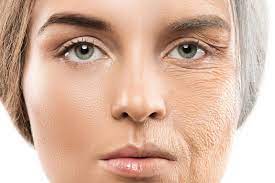Anti-Ageing Therapy

Anti-aging therapy in cosmetics encompasses a range of treatments and products designed to address and minimize the visible signs of aging, such as wrinkles, fine lines, sagging skin, and loss of skin elasticity. These therapies aim to promote a more youthful and revitalized appearance by targeting various factors that contribute to skin aging. Here’s a detailed overview of anti-aging therapy in cosmetics:
Key Components of Anti-Aging Therapy:
1. Collagen and Elastin Stimulation:
– Collagen and elastin are proteins that provide structure and elasticity to the skin. Anti-aging therapies often include ingredients and treatments that stimulate the production of these proteins to improve skin firmness and resilience.
2. Moisturization and Hydration:
– Adequate hydration is crucial for maintaining skin health. Anti-aging products often include ingredients like hyaluronic acid, glycerin, and ceramides to hydrate the skin, reducing the appearance of fine lines and creating a plump, smooth complexion.
3. Antioxidant Protection:
– Antioxidants, such as vitamins C and E, help neutralize free radicals that contribute to skin aging. Anti-aging products with antioxidants can protect the skin from environmental damage and promote a more youthful appearance.
4. Exfoliation:
– Exfoliation helps remove dead skin cells, promoting cell turnover and revealing fresh, radiant skin. Anti-aging products may contain exfoliating agents like alpha hydroxy acids (AHAs) or beta hydroxy acids (BHAs).
5. Retinoids:
– Retinoids, including retinol and prescription-strength retinoids like tretinoin, are derivatives of vitamin A. They are known for their ability to stimulate collagen production, promote cell turnover, and reduce the appearance of wrinkles.
6. Peptides:
– Peptides are short chains of amino acids that can have various benefits for the skin, including promoting collagen synthesis and reducing the appearance of fine lines. Anti-aging products may incorporate peptides for their rejuvenating properties.
7. Sun Protection:
– Sunscreen is a fundamental component of anti-aging therapy. Protecting the skin from UV rays helps prevent premature aging, including wrinkles, sunspots, and loss of skin elasticity.
8. Hormonal Therapies:
– Hormonal changes, especially during menopause, can contribute to skin aging. Some anti-aging therapies may include hormonal interventions to address specific skin concerns related to hormonal fluctuations.
9. Minimally Invasive Procedures:
– Cosmetic procedures like Botox injections, dermal fillers, and non-surgical facelifts are often considered part of anti-aging therapy. These procedures aim to restore volume, smooth wrinkles, and lift sagging skin.
10. Laser and Light Therapies:
– Various laser and light-based treatments, such as fractional laser resurfacing and intense pulsed light (IPL) therapy, can address skin concerns associated with aging, including uneven pigmentation and fine lines.
Anti-Aging Therapy Products:
1. Anti-Aging Serums:
– Concentrated formulations containing active ingredients like retinol, peptides, and antioxidants to target specific aging concerns.
2. Moisturizers with Anti-Aging Ingredients:
– Hydrating creams and lotions enriched with ingredients like hyaluronic acid and peptides to combat dryness and improve skin texture.
3. Eye Creams:
– Specialized formulations for the delicate skin around the eyes, addressing issues such as crow’s feet, dark circles, and puffiness.
4. Retinoid Creams:
– Over-the-counter retinol creams or prescription-strength retinoid creams for stimulating collagen production and reducing wrinkles.
5. Sunscreen:
– Broad-spectrum sunscreens with SPF to protect the skin from UV radiation and prevent photoaging.
Professional Anti-Aging Treatments:
1. Chemical Peels:
– Exfoliation treatments that remove dead skin cells, stimulate collagen production, and improve skin texture.
2. Microdermabrasion:
– Mechanical exfoliation that promotes skin renewal and addresses fine lines and uneven skin tone.
3. Injectables (Botox, Dermal Fillers):
– Minimally invasive procedures that target wrinkles, lines, and loss of facial volume.
4. Laser and Light Therapies:
– Advanced treatments to address pigmentation issues, fine lines, and skin tightening using laser and light technologies.
5. Microneedling:
– Collagen induction therapy that involves creating micro-injuries to stimulate collagen production and improve skin texture.
Considerations:
1. Personalized Approach:
– Anti-aging therapy should be tailored to individual skin concerns, needs, and goals. A consultation with a skincare professional can help determine the most effective plan.
2. Consistency:
– Consistent use of anti-aging products and adherence to recommended skincare routines are essential for optimal results.
3. Professional Guidance:
– Some anti-aging interventions, such as injectables and laser treatments, should be performed by qualified professionals (Dr. Sayali) to ensure safety and effectiveness.
4. Sun Protection:
– Daily use of sunscreen is crucial to prevent further damage and protect the skin from the aging effects of UV radiation.
5. Balanced Lifestyle:
– Healthy lifestyle choices, including a balanced diet, hydration, and regular exercise, contribute to overall skin health and the effectiveness of anti-aging therapies.
Anti-aging therapy in cosmetics offers a multifaceted approach to addressing the signs of aging, combining topical products, minimally invasive procedures, and lifestyle considerations. Individual results may vary, and a comprehensive approach that includes both home care and professional interventions is often the most effective in achieving a more youthful and rejuvenated appearance.
